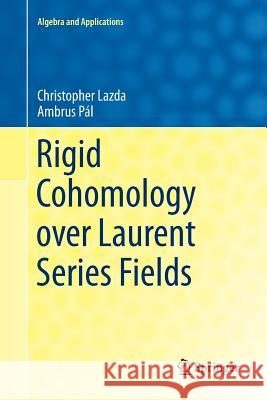Rigid Cohomology Over Laurent Series Fields » książka
topmenu
Rigid Cohomology Over Laurent Series Fields
ISBN-13: 9783319809267 / Angielski / Miękka / 2018 / 267 str.
Kategorie:
Kategorie BISAC:
Wydawca:
Springer
Seria wydawnicza:
Język:
Angielski
ISBN-13:
9783319809267
Rok wydania:
2018
Wydanie:
Softcover Repri
Ilość stron:
267
Waga:
0.39 kg
Wymiary:
23.39 x 15.6 x 1.5
Oprawa:
Miękka
Wolumenów:
01











